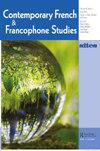性状态:种族、性别和其他“觉醒的争议”
IF 0.2
4区 文学
0 LITERATURE, ROMANCE
引用次数: 0
摘要
本文首先对法国的世俗化模式进行了历史分析,在laïcité之前和之后。通过对帝国和殖民世俗化谱系的分析,本书接着探讨了当代法国的一些结构性争论:1989年以来关于面纱的争论,以及最近知识分子之间关于沃基主义和伊斯兰左翼主义的争论。文章的最后一部分是对当前一些关于种族,性别和世俗主义的争论的理论干预,这些争论是由女权主义学者在法国和阿尔及利亚所做的。本文章由计算机程序翻译,如有差异,请以英文原文为准。
The Sexular State: Race, Gender, and the Other “Woke Controversy”
Abstract This article first deploys a historical account of the French model of secularization, before and beyond mere laïcité. Drawing on an analysis of the imperial and colonial genealogies of secularization, it then moves on to examine some structural polemics in contemporary France: polemics about the veil since 1989 and the more recent debate on Wokism and Islamo-leftism among intellectuals. The last part of the essay is a theoretical intervention in some of the current debates about race, gender and secularism in recent scholarship on France and Algeria done by feminist Scholars.
求助全文
通过发布文献求助,成功后即可免费获取论文全文。
去求助
来源期刊

Contemporary French and Francophone Studies
LITERATURE, ROMANCE-
CiteScore
0.30
自引率
0.00%
发文量
43
期刊介绍:
An established journal of reference inviting all critical approaches on the latest debates and issues in the field, Contemporary French & Francophone Studies (formerly known as SITES) provides a forum not only for academics, but for novelists, poets, artists, journalists, and filmmakers as well. In addition to its focus on French and Francophone studies, one of the journal"s primary objectives is to reflect the interdisciplinary direction taken by the field and by the humanities and the arts in general. CF&FS is published five times per year, with four issues devoted to particular themes, and a fifth issue, “The Open Issue” welcoming non-thematic contributions.
 求助内容:
求助内容: 应助结果提醒方式:
应助结果提醒方式:


